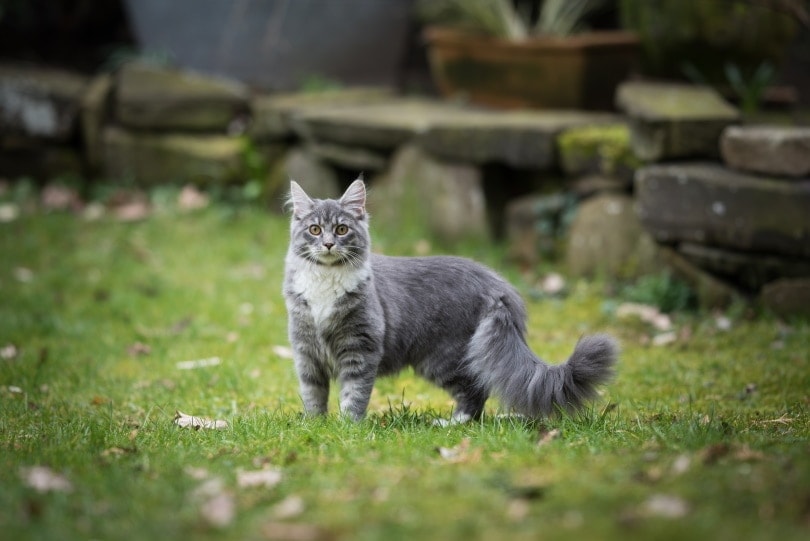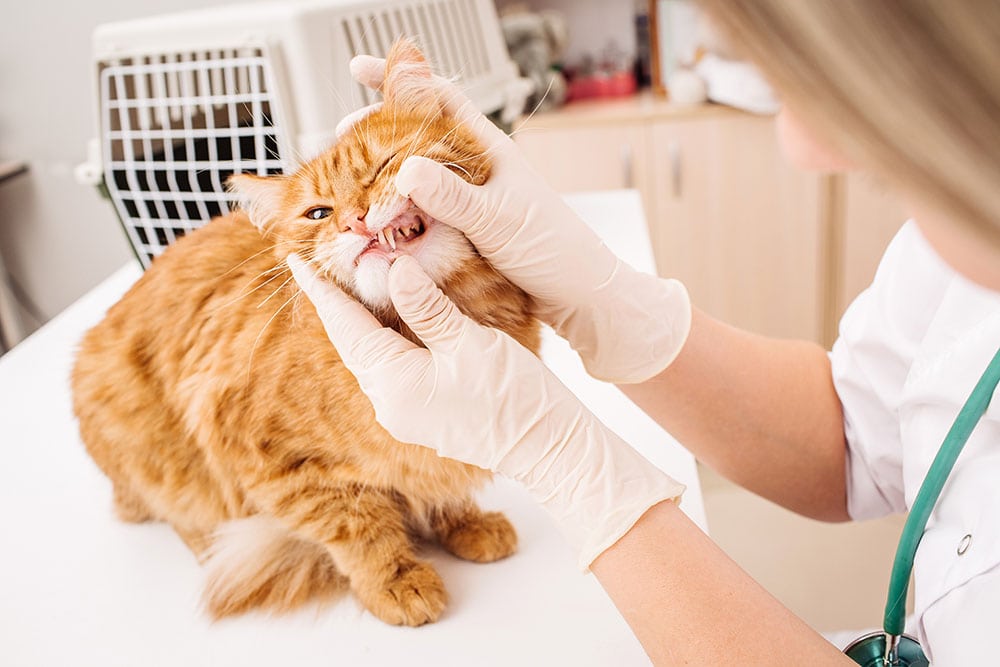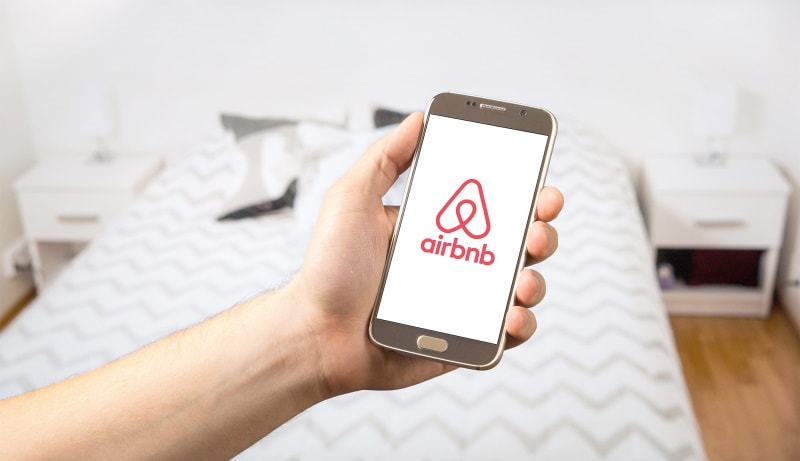How Much Does Cat Teeth Removal Cost? 2024 Pricing Guide
Updated on
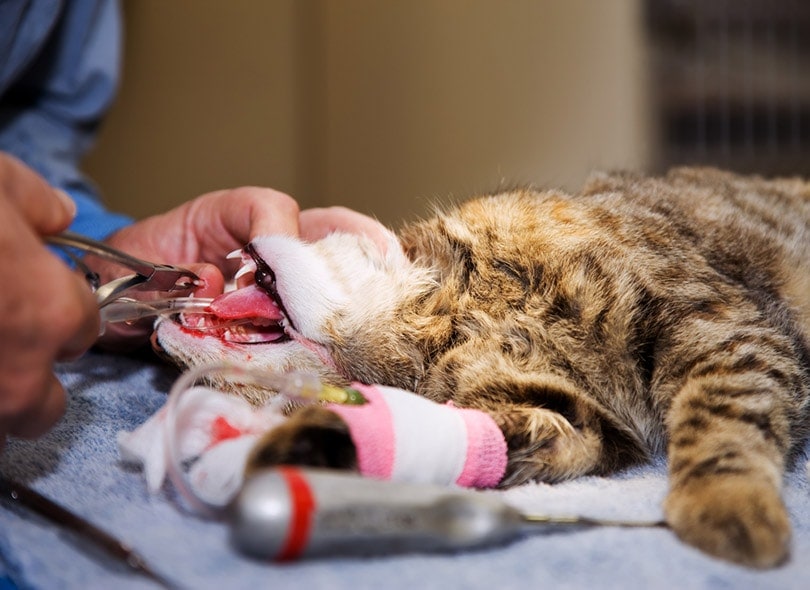
Click to Skip Ahead
Has your cat been pawing at his mouth lately? Have you noticed him struggling to eat his food? Does his breath almost knock you on your feet every time he meows in your general vicinity? If so, you might be dealing with tooth decay or other dental-related maladies.
Dental care for pets can be just as expensive as it is for humans. If you’re curious about what price you might be looking at for oral health visits for your cat, we can help. Keep reading to know everything you need to know about cat teeth removal, including costs and causes. The short answer is that cat teeth removal generally costs $50 to $130 per tooth.
The Importance of Cat Teeth Removal
Removing your cat’s teeth is necessary in some situations.
Extractions can help relieve your cat of oral pain. Several conditions can cause tooth pain including periodontal disease, feline chronic gingivostomatitis (FCGS), feline odontoclastic resorptive lesions (FORLs), or broken teeth.
Your cat may also be in pain because of retained deciduous (baby) teeth. If your cat doesn’t lose his baby teeth, the permanent tooth and the baby tooth will grow in the same jaw socket. Sharing this socket increases the chances of food becoming trapped between the two teeth. This can cause tooth decay, gingivitis, and periodontitis.
Malocclusion, or tooth misalignment, happens when your cat’s top and bottom jaws do not fit together as they should. There are several different types of malocclusion, some of which may eventually call for an extraction.
Sometimes tooth infections can cause abscesses to form in the gums. These pus-filled pockets are extremely painful and can make it hard for your kitty to eat or groom themselves. An abscess can lead to the destruction of bones and can even spread to other soft tissues in your cat’s face.
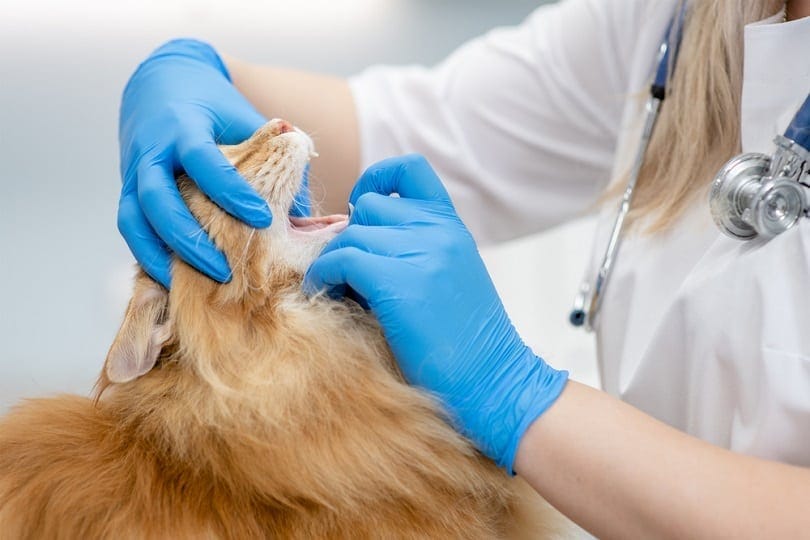
How Much Does Cat Teeth Removal Cost?
There are a lot of factors that must be considered when estimating a cat tooth removal procedure. The cost of tooth removal will vary from clinic to clinic and procedure to procedure. Some clinics offer fixed-rate dental packages, so you may need to call around to find a clinic whose fee schedule works well with your budget.
Generally speaking, you can expect to pay around $50–$130 per tooth. This price will vary depending on the location of the tooth. Some vets will provide a cheaper rate if they’re extracting more than one tooth at the same time.
Additional Costs to Anticipate
The final cost of your cat’s tooth removal will include things like hospitalization, anesthesia, intravenous fluids, pain medication, x-rays, and surgical supplies. Cats will need to be put under general anesthesia for tooth extraction and some may require hospitalization afterward.
According to Emergency Vets USA, you can expect to pay between $600 and $1,500 for a 1–2 day hospital stay and $150–$250 for X-rays.
Preventative Vet estimates IV fluids between $50 and $75 and pain medication between $40 and $80.
Specific procedures like root canals and complicated fractures often come with much higher price tags. Root canals for cats cost approximately the same as they do for humans so expect to pay between $1,500 and $3,000. Complex extractions, like those on fractured teeth, can ring up between $600 and $750.
If your cat needs a referral to a veterinary dental specialist, a consultation fee will occur. Most of these specialist consultation fees will fall in the $100 to $225 range. It’s not unusual to reach four figures if your cat has complex orthodontic needs.
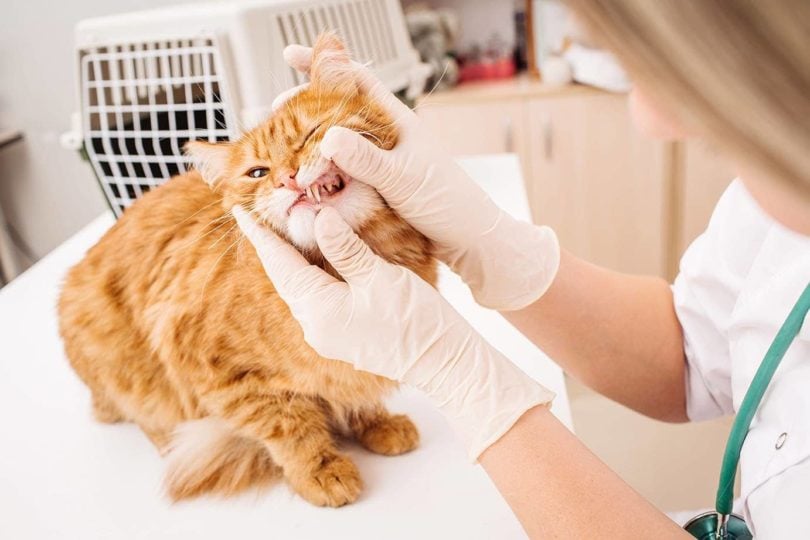
How to Prevent the Need for a Tooth Extraction
In many situations, tooth extractions can be prevented.
If you know your kitty has periodontal disease, brushing their teeth every day can help prevent tooth loss. You should also keep up with semi-annual dental cleanings to preserve the health of his teeth. It’s easier to take care of their dental health on a preventative basis, so the earlier you catch any potential issues, the better.
If your kitty has a fractured tooth and you don’t want it removed, you can ask your vet about having a root canal done instead. This procedure can be quite pricey, however, so if you’re looking to cut costs by having a root canal done versus an extraction, you won’t be happy with your quote.
There is specifically designed kibble on the market that can help reduce the likelihood of an extraction. This dental food helps to preserve the health of your cats’ teeth by mimicking the action of brushing and helping to remove plaque from the surface of their teeth. You can also find dental chews and treats that essentially scrub the tooth surface as they eat them.
Water additives can help kill some of the bacteria that reside in your cat’s mouth. This helps to prevent dental disease and will simultaneously freshen your kitty’s breath.
Does Pet Insurance Cover Cat Teeth Removal?
Pet dental illnesses can get expensive very fast. If you currently have pet insurance for your cat or are considering it, check to see if your plan includes dental coverage. Not all companies will include dental coverage in their policies and even those that do may not provide the type of benefits you’d like.
Your insurance company may provide comprehensive dental coverage in the case of a new and unexpected dental illness or injury. Some policies will cover dental illnesses but not annual exams or cleanings unless necessary to treat an illness.
Most pet insurance companies that offer dental illness coverage will cover extractions that are necessary due to illness or accidents.
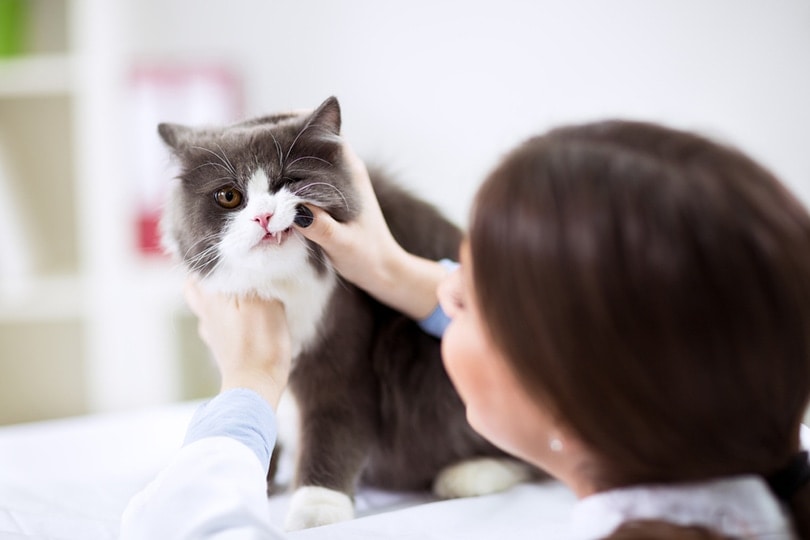
What To Expect After Oral Surgery
Your cat will rely on you for care and patience while they recover after any type of surgery.
When your kitty comes home from the vet, you’ll need to provide them with a quiet and warm area for them to rest. It should take a few hours for them to recover from the anesthetic, but it’s not unusual for it to take up to 48 hours to fully recover. Your cat might seem drowsy and may not want to eat.
Your vet will probably send you home with antibiotics and pain-relieving medication. You need to be diligent with the meds and follow your vet’s orders. Do not stop giving your kitty the antibiotic before the course is complete.
Your vet should also provide you with instructions regarding post-operative feedings as well as an idea of what complications to be on the lookout for. Remember, animals are extremely good at hiding when they’re in pain, so if your kitty is demonstrating unusual behaviors, it’s best to consult your vet.
- Bad breath
- Disinterest in toys
- Dropping food when trying to eat
- Pawing at face
- Eye drainage
- Eye swelling
Conclusion
Vet visits can be very expensive, but they’re a necessary part of owning any pet. Ensuring your cat’s dental health is in tip-top shape will help cut down on expensive vet bills in the long run. Take a proactive stance in your cat’s dental health by feeding them a healthy diet and brushing their teeth when you can. Don’t forget those annual (or, better yet, semi-annual) dental visits at their vet, too!
Keep browsing our website for more helpful tips on keeping your pets healthy and happy.
Featured Image Credit: CREATISTA, Shutterstock


